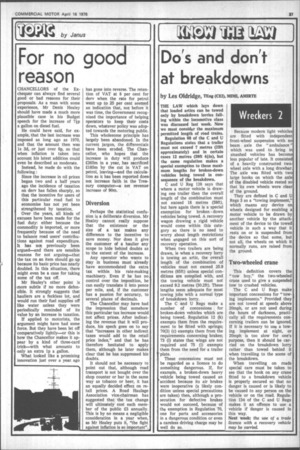For no good reason
Page 39

If you've noticed an error in this article please click here to report it so we can fix it.
CHANCELLORS of the Exchequer can always find several good or bad reasons for their proposals. As a man with some experience, Mr Denis Healey should have made a much more plausible case in his Budget speech for the increase of 74p a gallon on diesel fuel.
He could have said, for example, that the last increase was imposed as long ago as 1970, and that the amount then was is 3d, or just over 6p, so that when inflation is taken into account his latest addition could even be described as moderate.
Instead, he made do with the following : Since the increase in oil prices began two and a half years ago the incidence of taxation on dery has fallen sharply, so that the incentive for users of this particular road fuel to economise has not yet been strengthened by taxation.
Over the years, all kinds of excuses have been made for the fuel duty: either because the commodity is imported, or more frequently because of the need to balance road users' contributions against road expenditure. It has not previously been argued—and there are sensible reasons for not arguing—that the tax on an item should go up because its basic price has nearly doubled. In this situation, there might even be a case for taking some of the tax off.
Mr Healey's other point is more subtle if no more defensible. It strongly suggests that hauliers are a feckless lot, and would run their fuel supplies off like water unless they were periodically reminded of its value by an increase in taxation.
If applied to motorists, the argument might have had some force. But they have been let off comparatively lightly—or this is how the Chancellor makes it appear by a kind of three-card trick—with what amounts to only an extra lp a gallon.
What looked like a promising innovation just over a year ago
has gone into reverse. The retention of VAT at 8 per cent for dery when the rate for petrol went up to 25 per cent seemed an indication that, not before it was time, the Government recognised the importance of helping operators to keep their costs down, whatever policy was adopted towards the motoring public.
This wholesome principle has largely been abandoned. In the current jargon, the differentials have been eroded. The Chancellor, who hopes that the increase in duty will produce £265m in a year, has sacrificed £185m by the cut in VAT on petrol, leaving—and the calculation as it has been reported does, not increase faith in the Treasury computer—a net revenue increase of 90m.
Diversion
Perhaps the statistical confusion is a deliberate diversion. Mr Healey cannot really suppose that the existence or the size of a tax makes any difference to the incentive to save money. Nor does it give the customer of a haulier any scope to hide behind doubts as to the extent of the increase.
Any operator who wants to stay in business must already have accommodated the extra tax within his rate-making machinery. Even if he has no control over the imposition, he can easily translate it into pence per mile, and, if the customer has a passion for accuracy, to several places of decimals.
The Chancellor may have had the impression that somehow this particular tax increase would not affect prices. After indicating the revenue that it will produce, his spech goes on to say that "increases in other indirect taxes would add to the retail price index," and that he has therefore hesitated to apply them, although he later makes clear that he has suppressed his doubts.
It should not be necessary to point out that, although road transport is not bought over the shop counter or bar in the same way as tobacco or beer, it has an equally decided effect on retail prices. A Road Haulage Association vice-chairman has suggested that the tax change will ultimately cost each member of the public £3 annually. This is by no means a negligible consideration in a year when, as Mr Healey puts it, "the fight against inflation is so important".




























































































